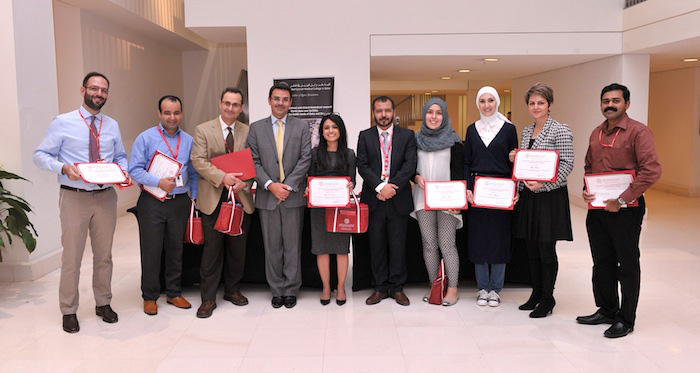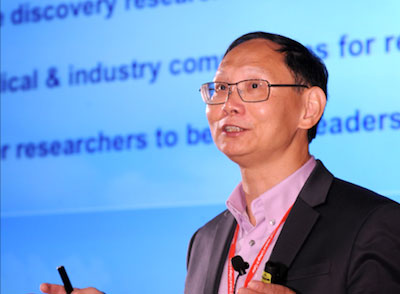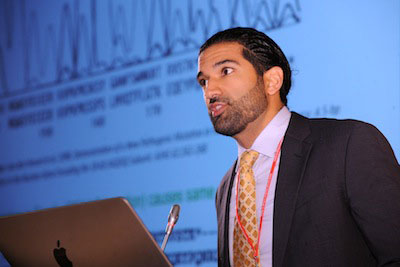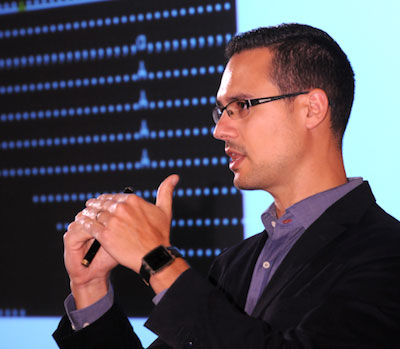WCMC-Q Research Retreat highlights Qatar’s role in regional scientific renaissance
March, 2015

Dr. Khaled Machaca, associate dean of research at WCMC-Q (fourth from left) with the winners of the poster competition.
The pioneering research being conducted at WCMC-Q has been showcased at the college’s 5th Annual Research Retreat.
Members of the research community at WCMC-Q and many other elite institutions gathered at the college to see presentations of the latest cutting-edge scientific investigations being conducted at WCMC-Q in a wide range of fields, including genetic medicine, hypertension, inherited diseases, diabetes, obesity, and the role of calcium in the cellular processes that underpin almost all aspects of life.
The annual event is designed to provide a forum for WCMC-Q researchers to share their investigations with members of the scientific community in Qatar. This year, more than 240 delegates were in attendance at the one-day event, including representatives of the Qatar National Research Fund, Hamad Bin Khalifa University, Supreme Council of Health, Hamad Medical Corporation, Qatar Foundation, Sidra Medical & Research Center, Qatar University and more.

The keynote speech was given by Professor Wanjin Jong,
executive director at the A* STAR Institute of Molecular &
Cell Biology in Singapore.
The event began with opening remarks given by Dr. Javaid Sheikh, dean of WCMC-Q, and Dr. Khaled Machaca, associate dean of research at WCMC-Q.
Dr. Sheikh said: “The annual Research Retreat has become a firmly established tradition at WCMC-Q and a keenly anticipated date in the calendar of the college. The event gives us the opportunity to discover the incredible inventiveness of the research faculty we are so fortunate to have here and to share their work with our peers.
“We are extremely proud to be able to play a key role in the thriving research community here in Qatar and to be making a valuable contribution to efforts to diversify the economy in line with Qatar National Vision 2030, with great support from our enlightened leadership through Qatar Foundation and Qatar National Research Fund. As such, it gives us great pleasure to showcase the results of the pioneering work being conducted in our laboratories.”
Delegates heard a keynote speech by Professor Wanjin Jong, executive director at the A* STAR Institute of Molecular & Cell Biology in Singapore, in which he recounted his experiences of seeing Singapore transformed into an international hub for biomedical research.
Dr. Machaca reflected: “The Research Retreat provides us with an excellent forum for bringing the scientific community together to appraise and discuss the progress that has been made in WCMC-Q’s research program over the past year. With the support of Qatar Foundation and guided by its vision to lead a regional scientific renaissance, our researchers have been able to record some remarkable successes in the past year, gaining publication in some of the most prestigious medical journals worldwide. In addition, the support from the Qatar National Research Fund (QNRF) in the form of various funding mechanisms across the continuum of scientific research has been essential to the growth and success of the research efforts at Weill Cornell Medical College in Qatar.
“The event also gives us the chance to share this good news with the rest of the scientific community and to highlight the fact that Qatar is fast gaining a reputation as an international center of excellence in biomedical research.”

Among the speakers was Dr. Khalid Fakhro, assistant
professor of genetic medicine, who presented his research
into genetic sequencing of inherited diseases among families
in Qatar.
The Research Retreat featured oral presentations by WCMC-Q researchers, with Dr. Lotfi Chouchane, professor of genetic medicine, speaking about genetic susceptibility to obesity and Dr. Joel Malek, assistant professor of genetic medicine, who explained his work on the genetic sequencing of the date palm. Dr. Khalid Fakhro, assistant professor of genetic medicine, presented his research into genetic sequencing of inherited diseases among families in Qatar.
Dr. Machaca delivered an address entitled ‘Hypertension & Calcium Signaling in Vascular Smooth Muscle’ and Dr. Shahrad Taheri, professor of medicine at WCMC-Q, spoke about conducting clinical research into diabetes and obesity on a collaborative basis among institutions. A visiting expert from Weill Cornell Medical College in New York, Dr. M. Elizabeth Ross, the Nathan Cummings professor and head of the laboratory of neurogenetics and development, discussed her work on defining genetic risk for spina bifida.
The Research Retreat also featured a total of 86 poster presentations by research specialists, students and postdoctoral fellows explaining the findings of projects conducted at the university over the past year. WCMC-Q has 35 active research laboratories investigating diverse areas, ranging from the basic molecular and cellular processes through to translational, clinical and population-based studies. There are now more than 200 staff and faculty members at WCMC-Q engaged in research, and the cumulative amount of extra-mural funding awarded to WCMC-Q researchers through competitive programs administered by Qatar National Research Fund has reached $89.5M over the past six years.

Dr. Joel Malek, assistant professor of genetic medicine, who
explained his work on the genetic sequencing of the date palm.
The Research Retreat drew to a close with the announcement of awards for the most accomplished poster presentations in three categories. First place in the student category was awarded to Mais Al-Kawaz for her poster on autistic-like behavior in genetically manipulated mice, while Tushar Khanna took second place with his poster on the characteristics of cerebral spinal fluid in children with an inherited neurodegenerative disorder called CLN2 disease. Dhabiya Al-Kubaisi won third place for her poster on biodiversity and barcoding lizards in Qatar.
In the research specialists category Ghina Mumtaz came first with a poster about HIV epidemics among drug users; Hina Sarwath was second with a poster about the significance of an identified protein in cervical cancer, and Susanne Awad was third with a poster about male HIV sufferers.
In the postdoctoral fellows category, Dr. Houari Abdesselem was first with a poster about the effects of a gene called SIRT1 on fat accumulation; Dr. Ioannis Petropoulos was second with a poster about the use of a special type of microscope to demonstrate nerve damage in diabetes patients; and third place was shared between Dr. Vimal Ramachandran with a poster about MicroRNA and Dr. Pegah Ghiabi with a poster about breast cancer.
